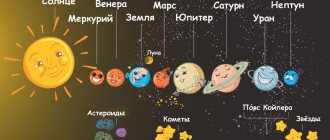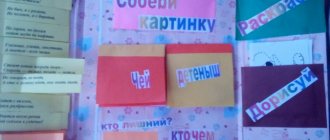Presentation for preschool children on the topic: “Development of time concepts”
DEVELOPMENT OF TEMPORAL REPRESENTATIONS IN SENIOR PRESCHOOL CHILDREN
Pedagogical Council
Performed
Teacher of MADO No. 150
Rybakova Irina Vladimirovna
Khabarovsk 2016
Theoretical aspects of the development of time orientation in children
- Currently, there is a rethinking of the goals, role and place of additional education of children in the entire system of domestic education and upbringing. One of the issues in studying the methods of mathematical development of preschool children is the formation of their temporal representations.
- A person faces the problem of time every day, every minute. Time is the regulator of all human activities; not a single activity takes place without the perception of time; the world around us exists in time. The specific features of time as an objective reality make it difficult for children to perceive it. Therefore, in pedagogical practice the question arises of how to show the time to a child.
The purpose of the work
is a study of the influence of didactic games on the development of temporal concepts in children of senior preschool age.
Achieving the goal will be facilitated by solving the following tasks:
— study theoretical approaches and methodological recommendations for introducing older preschoolers to time;
— study scientific and methodological literature on the perception of time by preschool children;
— test the author’s diagnostic methods to identify the level of formation of ideas about time;
— to develop a set of developmental activities for the formation of temporary concepts in children of senior preschool age
Object of study
:
the process of formation of temporal representations in children of senior preschool age.
Subject of research
:
didactic games in the formation of temporary relationships in a preschool child.
Hypothesis: if you use didactic games with children, the formation of temporary concepts in children will be more successful.
Research methods:
Theoretical:
analysis of scientific and methodological literature; study and analysis of diagnostic techniques.
Practical:
diagnostics of the level of assimilation of the concept of time; development of a set of developmental activities for the formation of temporary concepts in children of senior preschool age; analysis and interpretation of research results.
This work includes a whole range of tasks
— formation of primary practical orientation in time;
- formation of a sense of time;
— familiarization with individual “temporary” standards; - formation of initial ideas and concepts about some properties of time.
Sequence of training:
- 1.
We learn the names of the days of the week in order, connecting them with our activities
2.
Every day we say what day of the week it is today, yesterday, and tomorrow. - 3.
After studying the ordinal count, the days of the week are associated with the ordinal number.
.
Even older preschoolers have insufficient knowledge of how to measure time (using a calendar, clock). The names of time intervals (minute, hour) remain purely verbal and abstract for children, since life experience of activities during these periods of time has not yet been accumulated. .
Often preschoolers do not know the names of the days of the week and cannot determine their sequence. There is unevenness in remembering the days of the week; days that have a pronounced emotional connotation for the child are better remembered. This feature is also manifested in children’s memorization of the names of the months.
Time units: basic (day, week, month, year), derivatives (hour, minute, second). Children's acquaintance with units of time measurement should be carried out in a system of strict consistency, where knowledge of some time intervals, the ability to define and measure them, would serve as the basis for familiarization with subsequent ones and would reveal to children the essential characteristics of time: fluidity, continuity and irreversibility. Instruments for measuring time: watches (sandwatch, mechanical, electronic).
In the senior group, work begins with clarifying the concepts that were formed in the previous group. Particular attention is paid to learning to distinguish between parts of the day and determine the sequence. In this group, preschoolers should be able to determine the periods of the day, observing not only the work of people, but also the position of the sun.
To better remember the days of the week, you can use pictures, short poems, models, etc. In order for children to better remember the sequence of days of the week, we can recommend that parents reinforce these tasks at home.
Days go by, minutes melt away, Time flies by quickly What year is going on now - The calendar gives the answer What month it is - We look at the calendar.
Hours and minutes will pass, They will gather together in a day. They have twenty-four hours, and the hands work wonders.
At the beginning of the school year, children in the older group consolidate and deepen their understanding of such time periods as morning, afternoon, evening and night. As visual material, pictures or photographs are used that depict children in the process of various activities throughout the day: making the bed, morning exercises, washing, breakfast, etc.
Diagnostics of the level of assimilation of concepts of time
Diagnostics of the level of assimilation of concepts of time
Research base: MKDOU village. Sosnovka from September 2015 to March 2021.
The senior group of the kindergarten, including 15 people aged 5–6 years, took part in the study.
Purpose
:
to identify the level of mastery of the concept of time in children of senior preschool age.
Tasks:
- identify the level of formation of temporal representations in children of senior preschool age;
- develop a set of developmental activities for the formation of temporary concepts in children of senior preschool age;
- conduct a control diagnosis of the level of formation of temporal representations in children of senior preschool age.
The study was carried out in stage III.
Stage I –
diagnostics of the level of assimilation of the concept of time.
Stage II –
a set of developmental activities for the formation of temporary concepts in children of senior preschool age.
Stage III –
analysis and interpretation of research results.
A set of developmental activities for the formation of time concepts in children of the older group
Diagnostics showed results that are reflected in the diagrams
Let's compare the results of the first and second diagnostics
- At the beginning of the year, the children had a low level, but after a set of developmental activities, the high and average levels increased significantly. This means that the use of didactic games has a significant impact on the development of preschoolers’ time concepts.
- As we see, in the course of any lesson in kindergarten, it is possible to train children in the ability to perform work exactly within the specified time, teach them to determine the duration of this or that activity by time intervals and plan in advance the possible amount of work for a particular period of time in within 5-30 minutes. The educational value of such activities increases. In our experience, in such conditions, children worked more organized, were less distracted, regulated the pace of their activities and managed to do more. They did not waste time waiting for those who were lagging behind; everyone learned to finish their work at the same time, which is extremely important in terms of preparing for school. As the work progressed, the children’s sense of time and ability to regulate their activities over time became increasingly improved.
Time flies,
telling the children to grow up. The clock whispers like this: TICK-TOCK, TICK-TOCK!




